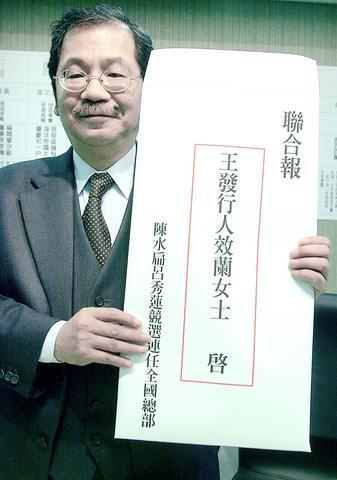The Democratic Progressive Party (DPP) yesterday accused the United Daily News (UDN) of tarnishing the reputation of President Chen Shui-bian (
Wu Nai-jen (
"The United Daily News published three stories, unverified and unattributed, on Feb. 6, 8 and 11 accusing the DPP government of involvement in a bribery scandal," Wu said. "But the stories do not have any specific evidence."

PHOTO: CHIEN JUNG-FENG, TAIPEI TIMES
"These stories not only mislead the public and hurt the president's honor, but also endanger the reputation of the United Daily News," he said.
Wu said the stories are in violation of Article 92 of the Election and Impeachment Law, which regulates spreading rumors in an attempt to affect the outcome of an election.
He called the media's performance during this presidential election campaign the worst in more than 20 years.
Wu said the intention of the United Daily News to sway the election has damaged the credibility of the media, and the DPP hopes the letter will prompt the newspaper to improve.
He cited an editorial in the United Daily News on its 47th anniversary that upheld "anti-communism, democracy, unification and progress" as its principles, but said the newspaper has violated its own principles and ethos.
Wu said the DPP could no longer put up with such irresponsible reports and that it decided to fight back against the paper.
"We will start with a rational appeal, but we haven't decided yet whether to take legal action against the United Daily News."
"Article 92 not only refers to civil issues but also may lead to imprisonment for five years," Wu said. "If the United Daily News fails to make an improvement, we will resort to legal procedures."
Responding to Wu's remarks, the paper issued a statement saying, "The United Daily News deals with stories according to journalistic professionalism and journalistic ethics."
It called on candidates to respect the media's role in society.
Meanwhile, the DPP's campaign headquarters said the pan-blue camp was using campaign tricks that have been condemned in other democratic countries.
"The first kind of blue-camp negative campaign trick is to make up facts and then implicate an opponent," Wu said, "like when former legislator Lin Ruey-tou (林瑞圖) claimed that Chen Shui-bian had gone to Macau for a wench in 1998.
"The second one is to create a sensational story for slandering. This includes when People First Party [PFP] Legislator Chiu Yi (
"The third is to viciously impute blame to another, such as when PFP Legislator Diane Lee (李慶安) accused former Department of Health head Twu Shiing-jer (涂醒哲) of being involved in a sexual harassment case in October 2002. She later apologized for accusing the wrong person," Wu said.
"The last kind is to spread slanderous rumors with groundless talk, such as PFP Chairman James Soong (
Wu said the blue camp's ridiculous rumors have developed to an evil degree and are even encouraged by the blue camp's vice presidential candidate, Soong.
"We hope the media do not serve as those evil tricks' accomplice," he said.

AIR SUPPORT: The Ministry of National Defense thanked the US for the delivery, adding that it was an indicator of the White House’s commitment to the Taiwan Relations Act Deputy Minister of National Defense Po Horng-huei (柏鴻輝) and Representative to the US Alexander Yui on Friday attended a delivery ceremony for the first of Taiwan’s long-awaited 66 F-16C/D Block 70 jets at a Lockheed Martin Corp factory in Greenville, South Carolina. “We are so proud to be the global home of the F-16 and to support Taiwan’s air defense capabilities,” US Representative William Timmons wrote on X, alongside a photograph of Taiwanese and US officials at the event. The F-16C/D Block 70 jets Taiwan ordered have the same capabilities as aircraft that had been upgraded to F-16Vs. The batch of Lockheed Martin

GRIDLOCK: The National Fire Agency’s Special Search and Rescue team is on standby to travel to the countries to help out with the rescue effort A powerful earthquake rocked Myanmar and neighboring Thailand yesterday, killing at least three people in Bangkok and burying dozens when a high-rise building under construction collapsed. Footage shared on social media from Myanmar’s second-largest city showed widespread destruction, raising fears that many were trapped under the rubble or killed. The magnitude 7.7 earthquake, with an epicenter near Mandalay in Myanmar, struck at midday and was followed by a strong magnitude 6.4 aftershock. The extent of death, injury and destruction — especially in Myanmar, which is embroiled in a civil war and where information is tightly controlled at the best of times —

China's military today said it began joint army, navy and rocket force exercises around Taiwan to "serve as a stern warning and powerful deterrent against Taiwanese independence," calling President William Lai (賴清德) a "parasite." The exercises come after Lai called Beijing a "foreign hostile force" last month. More than 10 Chinese military ships approached close to Taiwan's 24 nautical mile (44.4km) contiguous zone this morning and Taiwan sent its own warships to respond, two senior Taiwanese officials said. Taiwan has not yet detected any live fire by the Chinese military so far, one of the officials said. The drills took place after US Secretary

THUGGISH BEHAVIOR: Encouraging people to report independence supporters is another intimidation tactic that threatens cross-strait peace, the state department said China setting up an online system for reporting “Taiwanese independence” advocates is an “irresponsible and reprehensible” act, a US government spokesperson said on Friday. “China’s call for private individuals to report on alleged ‘persecution or suppression’ by supposed ‘Taiwan independence henchmen and accomplices’ is irresponsible and reprehensible,” an unnamed US Department of State spokesperson told the Central News Agency in an e-mail. The move is part of Beijing’s “intimidation campaign” against Taiwan and its supporters, and is “threatening free speech around the world, destabilizing the Indo-Pacific region, and deliberately eroding the cross-strait status quo,” the spokesperson said. The Chinese Communist Party’s “threats